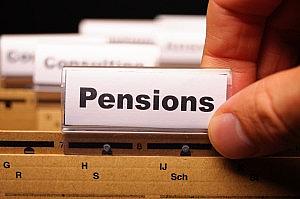Pensions – wouldn’t we all like to opt out?

I have a friend – let’s call her Heather, because everyone else does – who cannot wait to get her free pensioner’s bus pass. “But that’s 20 years away!” I said, a little louder than strictly necessary when she shared the news with me on the top deck of a busy bus. The thought of ever being old enough to qualify for a pensioner’s anything filled me with complete gloom.
So I must admit I haven’t been paying all that much attention to yesterday’s announcement of a flat rate state pension. The last time I really thought about my pension was shortly after I started work and I was roped into some complicated private pension plan which, from what I can remember, involved me being bamboozled with graphs and the sort of wooden rods we used to learn fractions with at school. It felt a bit like being invited into a weird exclusive game of poker and I always felt that if I could get back into the lift without committing more than another £20 a month I was ahead of the game.
At first the only thing I could really pick up from yesterday’s news was that the new state pension system would be ‘simpler’, replacing two different variable pensions with one flat rate for all. That, in itself, doesn’t sound particularly financially advantageous does it? My son’s financial arrangements are very simple. He gets £2.50 pocket money every Friday. Business magnate Warren Buffett’s financial arrangements are a little more complex. Which would you rather have to worry about?
So I was grateful that my new best friend, Danny Cox, head of advice at investment firm Hargreaves Lansdown, took the trouble to explain the new state pension system to me. Here, thanks to him, is the gist of what the Government is planning to do with the state pension.
By 2017, the current basic and earnings related state pension systems will be replaced with one single-tier state pension. In a nutshell:
- The savings credit element of the pension credit will be abolished
- There will no longer be an earnings related element to the state pension
- Contracting out will be abolished
- Single pension to be set at £144 a week in today’s money, starting April 2017, based on 35 years’ service. This is likely to around £162 a week in 2017
- In order to qualify for the new state pension, you must have paid National Insurance for at least ten years
- The ‘triple lock’ guarantee (the higher of the Consumer Price Index, earnings and 2.5%) will continue to apply to the state pension
Winners:
Tax payers, the self-employed, women who have interrupted their career to bring up children
Losers:
Those in their 20s and 30s who will have to work longer for relatively less pension compared with today
Recent immigrants who cannot build up ten years’ worth of National Insurance contributions before they retire
High earners, who will no longer be able to contribute to the higher earnings second tier state pension

Leave a Reply
Please login or register to leave a comment.